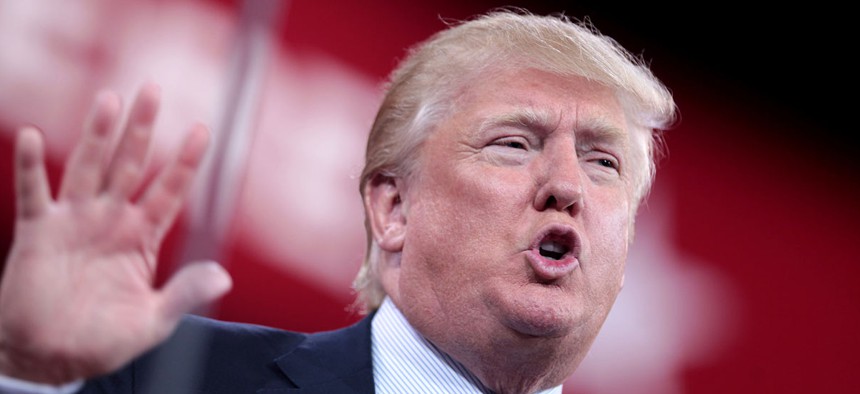
"Huge." Flickr user Gage Skidmore
How to Sound Charismatic
A researcher examines how politicians change their pitch and volume to attract voters
At a February 23 rally in Sparks, Nevada, Donald Trump pandered, as politicians are wont to do. He mentioned how “nobody loves the Bible more than I do,” and that “we have to change our system, folks,” and other things he believes to be pleasing to the median caucus-goer’s ear.
But if you listen closely, you can detect how he panders not just with his words, but with how he says them:
“By the way I think I’m going to win the Hispanic vote,” Trump says, and then a little more loudly and emphatically, “Do you know in the state of Nevada I win with Hispanics?!” Then, softly again: “They know I’m going to bring jobs in. They know I’m going to take jobs away from Mexico and China and all these places.”
It’s this variation of pitch and volume, deployed strategically by politicians, that interests Rosario Signorello, a postdoctoral researcher in the Department of Head and Neck Surgery at UCLA’s David Geffen School of Medicine.
For research he is presenting this week at the Acoustical Society of America in Salt Lake City, Signorello and his colleague Nari Rhee examined the speaking strategies of American politicians to see what kinds of vocal tricks they use to influence voters.
They found that when the candidates address voters in large stadiums, they vary their pitch and volume throughout the speech, just as Trump did in Nevada in February.
That’s because bigger audiences mean more people, and thus more leadership traits that people will want to see, Signorello said. During rallies politicians must shape-shift, resonating with as many different leader-archetypes as possible.
“At a Hillary Clinton rally, people might expect a masculine leader, a charming one, others might expect an authoritarian leader,” he said. “To convey all this, Clinton has to use all the patterns that she can with her voice.”
According to Signorello’s research, which has not yet been published, most candidates varied their voices during rallies. One standout was President Obama, whose voice does not seem to dip into the lower registers as much as the other politicians studied.
Clinton and Trump also differ in how they modulate their voices over the course of one speech. Clinton’s voice tends to get deeper as the speech wears on, which might mean she’s trying to end on a calm note, Signorello said.
Trump, meanwhile, does the opposite: He goes up in pitch and volume as he goes.
“He says ‘terr-IFFIC’ or ‘you’re a los-ER!’” Signorello said.
That’s a good way to lead the audience and keep them listening. “The audience will never get bored and they will always cheer,” he said.
Meanwhile, when politicians address a group of their peers—Signorello studied Clinton speaking to the United Nations Commission on the Status of Women and Trump appearing at a New Hampshire Leadership Summit—they use a much lower-pitched voice, and they change their pitch very little.
That’s a sign they’re trying to seem authoritative and confident, he said. Other mammals use the same vocalization styles to project physical size, power, or dominance.
“Normally, larger people have larger, heavier vocal folds which vibrate more slowly, and therefore produce a lower fundamental frequency,” Jan Schnupp, co-director of Oxford University’s auditory neuroscience group, told the BBC . “So we associate deep voices with an impressively large physique.”
Most politicians have learned to modulate their voices to suit the situation. But sometimes, not even skilled statesmen have full control over how they’re perceived. Previously , Signorello studied the Italian politician Umberto Bossi, who in 2004 suffered a stroke that impaired his speech. He found that prior to the stroke, people thought of Bossi as an authoritarian leader, thanks to the overall low, but widely varying, pitch in his speeches. After the stroke, though, his pitch range flattened out—and people began to see him as more benevolent and competent.
Successful speaking styles can also reflect the spirit of the times. Based on their vocal patterns, for example, French President Francois Hollande would likely be perceived as a benevolent leader and Nicolas Sarkozy an authoritarian one, Signorello said. Hollande, of course, won the election in 2012—perhaps because the softer manner of the Socialist candidate was appealing.
But if the election were held on the heels of the recent terror attack in Paris, the French public might look to someone a bit more brash.
A bit more like, say, le Donald?
According to Signorello, Trump is riding his supporters’ fear and anger well.
“He’s very smart in trying to appear authoritarian,” he said. “It could be successful. But I cannot say that. I have my ideas, but I’m a scientist.”
( Image via Flickr user Gage Skidmore )






